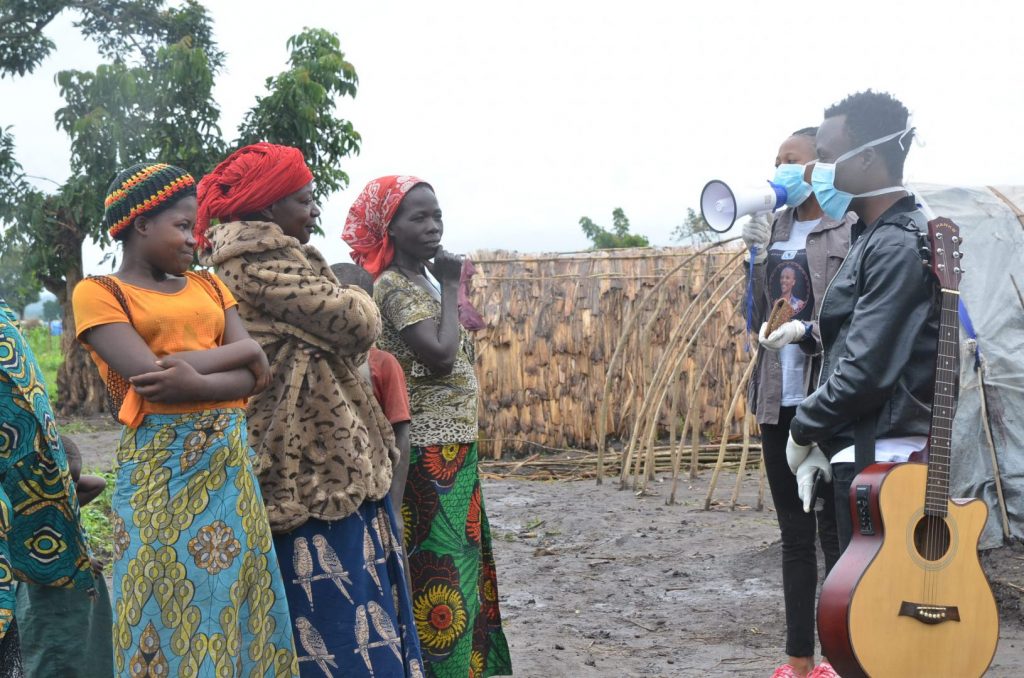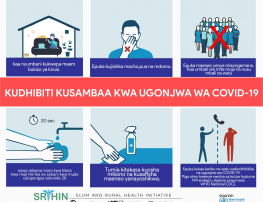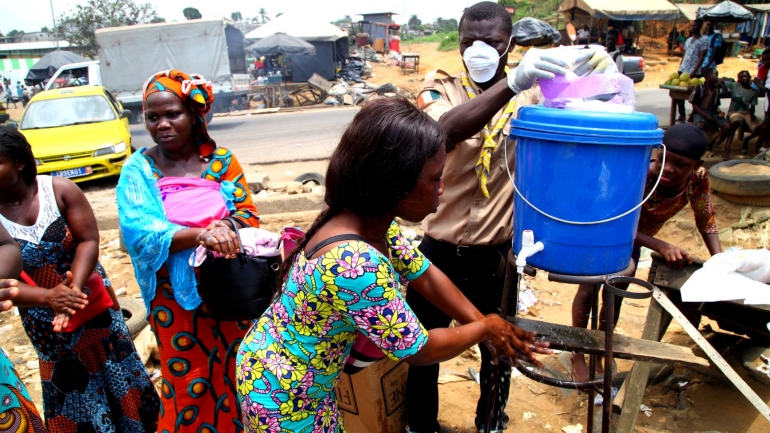This is a shortened and slightly updated version of a post by Alcinda Honwana and Nyeleti Honwana, which first appeared on the SSRC’s Kujenga Amani blog
The African continent has, thus far, fared comparatively well in the pandemic, with just under 400,000 confirmed infections and about 10,000 fatalities at the end of June 2020. Even so, the heavy economic, social, and emotional toll of the pandemic on the continent is already clear, and some analysts believe that the situation will worsen in the coming months.
Not the “Same Old” Response
Given its under-resourced health-care systems and lack of social safety nets, Africa’s best hope for mitigating the spread of Covid-19 lies in community-based prevention. We contend that Africa’s large youth population must play a prominent role in that. In fact, young volunteers are already involved in a myriad of actions to support their communities:
1) mitigating contamination through communication and accessibility to information, control of digital spaces, and provision of health and related services; and
2) promoting community cohesion and social solidarity with appreciation for local values and kinship bonds, and with support for the most vulnerable.
Mitigating Contamination
Young people are using social media platforms to communicate and disseminate information as well as organizing within their communities through canvassing campaigns and public awareness programs alongside community leaders.

In Kivu, Democratic Republic of the Congo (DRC), Joseph Tsongo, a young leader of the Amani Institute, enlisted a group of young volunteers to visit markets, town squares, and businesses and go door-to-door distributing informational pamphlets on how to stop the spread of Covid-19.
In Burkina Faso, the National Youth Council established Battalion 2020 against Covid-19, a training program on health, sanitation, and social measures for 1,500 young volunteers working in various communities across the country. In addition, young Burkinabe leader Emmanuella Toé and her colleagues are collaborating with the Femmes Riposte Covid-19 (women’s response to Covid-19) program to produce informational pamphlets urging people to wear masks and respect physical distancing guidelines. Isaac Olufadewa from Nigeria is a young man running the Slum and Rural Health Initiative that has produced “Stop Covid-19” infographics in more than sixty local African languages to spread accurate information about the pandemic.
Social media influencers, musicians, poets, painters, social and political activists, and television and sports stars are using their own talents and social platforms to reach out to others, reaching millions of people. In Mozambique, the popular reggae fusion band GranMah released “Lava as tuas Mãos” (wash your hands), a video with instructions on proper handwashing techniques and alternatives to handshakes. In South Africa, the famous Ndlovu Youth Choir composed, performed, and filmed a musical rendition of the World Health Organization’s (WHO) Covid-19 safety advice, featuring translations in various South African languages.
In Côte d’Ivoire, Ibrahima Diabaté and the Youth Peace and Security Network recorded a series of awareness-raising videos in different local languages to propagate information about the new coronavirus. All of these videos went viral on social media platforms, especially Facebook, Twitter, and WhatsApp. The use of local languages and the cultural translation of the messages in ways that make sense to the communities they target have enhanced their accessibility.
The control of digital spaces has been an ongoing battle for many young activists on and beyond the continent, with many building their own independent platforms to fight the Covid-19 pandemic. Stowelink, a youth-led digital enterprise in Kenya is gathering and disseminating up-to-date, accurate information about Covid-19 in English, Kiswahili, and Amharic. Also, in an effort to curb fake news and quell panic, two recent graduates of the University of Cape Town established the Coronapp—a tool that centralizes information flow about the pandemic.
In South Sudan, Nelson Kwaje from #DefyHateNow launched a digital community of youth from various fields who collaborate to fight misinformation and raise awareness on coronavirus prevention. Likewise, the Community Mutual Aid Crisis Response online platform created by Mbiydzenyuy Ferdy, a young Cameroonian entrepreneur, connects people in need of assistance with service providers and community volunteers. Online digital platforms are also bringing together young people and the wider population to share ideas and prevention practices. In Uganda, using the slogan “Our challenges, our solutions!,” a group of young people from Zetu Africa (Our Africa) launched the campaign #SmarterThanCorona to bring people together to share information and discuss solutions to problems caused by the Covid-19 outbreak.

Young people in many countries have also taken an active role in providing access to preventive health services and equipment. In Kenya, Victor Odhiambo, a young entrepreneur, and his team at the Garden of Hope Foundation raised money to set up several handwashing stations in Kibera. In Cameroon, a group of young people started the One Person One Hand Sanitizer initiative. They produce homemade hand sanitizer following WHO guidelines, and to date they have produced and dispensed over 10,000 bottles of hand sanitizer to communities in need and disinfected neighborhoods and public spaces in Douala. The initiative is now supported by the Cameroonian Ministry of Youth Affairs and the Ministry of Health. Collaboration with government institutions often facilitates the work of volunteers and bolsters their impact through the use of state resources.
Perhaps the greatest show of solidarity has been the production of masks in communities across the continent, made in Kente cloth, Ankara fabrics, Capulana textiles, and more. Indeed, from Nigeria to Liberia to Mozambique, young people are at the fore of mask making and distribution. The masks are donated to medical institutions, made available to the public for free, or sold at discounted rates.
Enhancing Community Cohesion and Solidarity
Combating Covid-19 requires a strategy that also addresses the social, cultural, and emotional consequences of the lockdown, widespread illness, and death. Information about contamination and calls for behavioral changes are more effective when embedded within local understandings of sociability and interpersonal relationships.
The majority of Africans live in community. The Zulu notion of Ubuntu means that we are all bound together. Umuntu Ngumuntu Ngabantu (I am, because we are) speaks to human interconnectedness and represents the various threads that bind together the human spirit.
Likewise, the Swahili notion of Ujamaa, espoused by Julius Nyerere, represents familyhood, extended family, and brotherhood or sisterhood. Similar concepts exist in other languages and cultures across the continent. The spirit of community brings human beings together and fosters love, cohesion, and solidarity; it is apparent in the way African communities live, work, celebrate, and mourn. In moments of great strife, such as Ebola, HIV/AIDS and now COVID-19, solutions and problem-solving are undertaken by the collective.
Young volunteers leading Covid-19 campaigns are connecting with and engaging local leaders—women’s groups, teachers, priests, imams, village heads, healers, and elders—in their communities. Together they are devising microsolutions needed to isolate patients, care for the ill, implement social distancing within existing conditions, and support families in distress. More effective physical distancing measures tailored around family units (often consisting of extended families) rather than individuals favor household cohesion and collective action rather than individual responsibility.
Given the lack of social safety nets in most countries on the continent, young people have included support services and foodstuffs as part of their interventions. In Kenya, young leaders Wevyn Muganda and Suhayl Omar cofounded Mutual Aid Kenya, a grassroots disaster relief organization that collects mobile money donations from Kenyans to buy and distribute food packages to poor households in Nairobi and Mombasa. Additionally, in Côte d’Ivoire, Mahmood Ouedraogo, an activist for deaf youth, approached several businesses in Abidjan for food donations to support hearing-impaired people and their families.

In various countries across the continent, Scouts groups have launched community-level Covid-19 responses in active collaboration with the authorities, NGOs, and the private sector. In Ghana, Scouts of the Ashanti region teamed up with a local branch of international fast food restaurant chain KFC to provide hot meals and water to vulnerable families. In Kilifi, Kenya, Scout groups launched the “lend a helping hand” project and are distributing relief food packages to vulnerable communities. In Cape Verde, Scouts are teaming up with the Red Cross in the supply of relief items to families in need. In South Africa and Botswana, the Rover Scouts are running errands, grocery shopping, and delivering items for families unable to leave their homes. In the DRC, Scouts are providing street children with temporary shelters, food, and face masks. In Namibia, they are spreading messages of love and solidarity and encouraging people to stay home and stay safe.
These are some examples of countless initiatives already taking place at the local and national level. While the majority are spontaneous and isolated, others are collaborative endeavors between youth-led civil society groups, civil society and community-based organizations, government institutions, and regional or international bodies. These types of partnerships are significant for various reasons: firstly, they allow youth to engage with the public, private, and third sector; and secondly, they afford youth—often seen as apathetic and uninterested in general social welfare—a level of legitimacy and authority they might not attain were they operating unilaterally. This is especially true given the leadership roles that elders have traditionally held in the community.
Although this pandemic will have devastating health and socioeconomic effects on the continent, it also offers the potential opportunity to rebuild trust and begin rewriting the narrative of Africa’s young people.